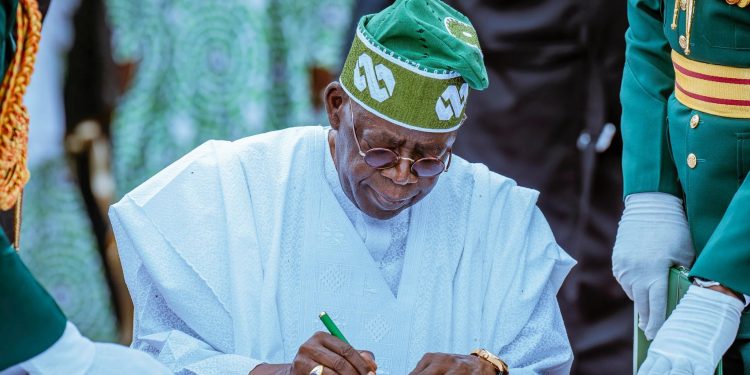The Nigerian government has projected a fiscal deficit of N13.08 trillion for 2025, marking a significant increase from the N9.18 trillion estimated for 2024. This deficit, which represents about 38% of the country’s total revenue and 3.87% of the country’s estimated GDP, is one of the largest in recent history and highlights the ongoing challenges faced by the Nigerian economy in balancing revenues with rising expenditure.
Rising Debt and Cost Drivers
The increase in the fiscal deficit is largely due to factors such as the new minimum wage, rising pension obligations, consequential adjustments to salaries and benefits, and the growing burden of debt servicing costs. In particular, the government’s budget analysis indicates that a significant portion of the projected expenditure of N47.9 trillion will be devoted to debt service (N15.38 trillion) and recurrent spending (N14.2 trillion), leaving just N16.4 trillion for capital expenditure, which is vital for infrastructure development and long-term economic growth.
Despite the increase in expenditures, revenue targets have been set at N34.8 trillion, primarily driven by oil revenues (N19.6 trillion), non-oil taxes (N5.7 trillion), and independent revenue sources from government-owned enterprises (GOEs) and other areas. However, these revenue projections still fall short of bridging the gap between the government’s income and its spending commitments.
Financing the Deficit: Borrowing and Privatization
To finance the N13.08 trillion deficit, the Nigerian government is planning to rely heavily on borrowing. This includes N7.3 trillion in domestic loans and N1.8 trillion in external financing, with a combined total of N9.2 trillion making up a significant portion of the deficit. In addition, the government expects to raise another N3.5 trillion through multilateral loans (from institutions such as the IMF and World Bank) and bilateral loans, with the remainder to come from privatization proceeds.
This heavy reliance on borrowing to fill the fiscal gap has raised concerns about the sustainability of Nigeria’s public debt. With the government targeting an increase in borrowing and debt servicing costs, Nigeria’s public debt stock, which stood at N87.3 trillion in 2023, is expected to top N135.8 trillion by mid-2024. If the planned borrowing of N9.2 trillion goes through, Nigeria’s debt could exceed N150 trillion by the end of 2025, assuming no drastic changes to the exchange rate or other fiscal dynamics.
A Pattern of Deficits and Debt Accumulation
This projection of a growing fiscal deficit is consistent with Nigeria’s pattern of running budget deficits for several years. For example, in 2023, Nigeria’s total revenue exceeded projections by 13%, reaching N12.84 trillion, but total expenditure stood at N23.04 trillion, resulting in a deficit of N9.66 trillion. The government financed this deficit largely through domestic borrowing, a practice that has contributed to the country’s ballooning debt.
Already in 2024, Nigeria is on track to face a fiscal deficit of N4.2 trillion in the first eight months, driven by shortfalls in both revenues (N12.7 trillion against a pro-rata target of N13 trillion) and higher-than-expected expenditures (N16.9 trillion against a pro-rata target of N23.3 trillion). These growing deficits indicate an ongoing struggle to balance fiscal spending with available revenue, with no immediate solutions in sight.
In an effort to improve its fiscal position, Nigeria’s government is looking to tax reforms, automation, and enhanced compliance as key strategies for increasing revenues. These reforms, being spearheaded by a team led by Taiwo Oyedele, are expected to help boost government revenues in the coming years. While tax collection remains a critical component of this strategy, the government also aims to reduce inefficiencies in the tax system and clamp down on tax evasion.
However, Nigeria’s reliance on non-oil revenues, particularly taxes, faces a range of challenges, including an underdeveloped tax base, widespread informality in the economy, and difficulties in enforcing compliance. Despite these challenges, if successfully implemented, these reforms could gradually strengthen Nigeria’s fiscal position and reduce its dependence on borrowing.
Impact of Fiscal Deficits on Exchange Rates and Inflation
The persistent fiscal deficits also have wider economic implications, especially for Nigeria’s exchange rate and inflation. Fiscal deficits lead to increased government borrowing, which can drive up interest rates and inflate debt servicing costs. As the government borrows more, it increases demand for foreign currency, which in turn puts pressure on the naira and leads to depreciation.
This cycle of borrowing and currency depreciation is further compounded by Nigeria’s dependence on imported goods and services, which drives up inflation and adds to the cost of living for Nigerians. With the government continuing to rely on deficit financing, the exchange rate pressures and inflationary risks could worsen, further straining the economy.
Long-Term Sustainability and Economic Stability
As Nigeria navigates its fiscal challenges, there is a growing concern about the long-term sustainability of this approach. While borrowing may offer a short-term solution to budget gaps, it is unlikely to provide a sustainable path to economic stability unless there is a significant shift in revenue generation and expenditure management. The government’s reliance on borrowing and deficit financing poses risks not only to the nation’s fiscal health but also to the broader economic environment.
Moreover, the increasing cost of debt servicing and rising inflation could stifle economic growth and create barriers to investment, both domestic and foreign. For businesses, particularly MSMEs, this scenario can lead to higher borrowing costs, limited access to capital, and a more challenging operating environment.










